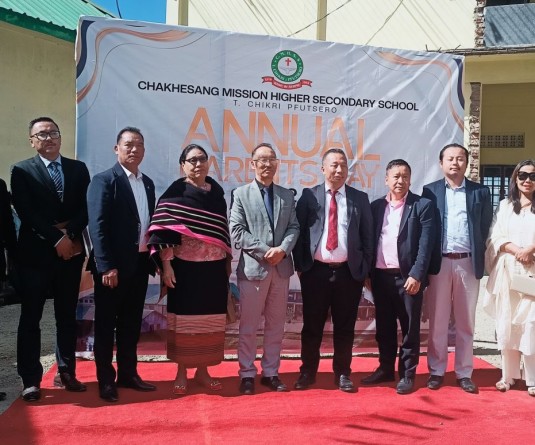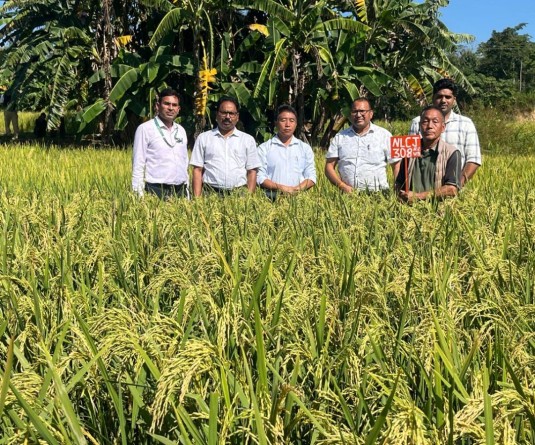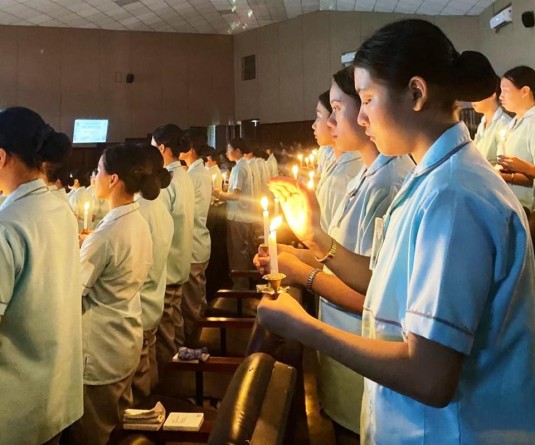
Morung Express News
Dimapur | February 18
With polling day in Nagaland fast approaching (February 27), each political party has raised its rhetoric and the big picture remains either diluted or wholly absent from public discourse.
Thus, the audience at a program organized on Saturday, February 17 at Don Bosco Institute in Dimapur, reacted sharply to political parties that attempted to skirt responsibility for creating a sordid state of affairs in Nagaland.
In the back and forth open interaction called ‘The Big Picture’ under the theme ‘Policy Matters’, the audience reacted with claps for notable points made, demanding answers from political parties and every once in a while burst out laughing when the political representatives indulged in taunting each other, or praised themselves needlessly.
The interaction was organized jointly by Heritage Publishing House, The Naga Republic and The Morung Express. Major political parties that will contest polls to the 13th Nagaland Legislative Assembly took part in the interaction, namely, the Bharatiya Janata Party, Indian National Congress, Naga People’s Front, Nationalist Democratic Progressive Party and National People’s Party.
If voted to power
To a question on the different manifestoes for human resource development, the NPP’s Samuel Sumi proposed setting up an IIT in the state besides engineering and medical colleges while the BJP promised free laptops for meritorious higher secondary students.
The NPF assured free education for girls up to university level. NPF Spokesperson Achumbemo Kikon stated that his party would ensure timely release of scholarships “if voted to power.”
The Congress’ Capt. GK Zhimomi took a jibe at the ruling dispensation stating that they were still talking of promises and not achievements. In its manifesto, the Congress proposed increasing the intake of medical seats for the state and also suggested entering into Private-Public-Partnership (PPP) arrangements for government institutes to uplift higher education.
They were reminded, however, that provisions and schemes to develop human resources and welfare programmes exist. Can the political parties give concrete plans to hold their leaders and the bureaucracy accountable for the lapse in implementing the schemes?
To this, Achumbemo Kikon of the NPF responded that the Nagas are a “very small family” which results in a lot of “hassles” but, assured that the party would ensure accountability if voted back to power.
“If we don’t spend money, we cannot win election.”
Kikon also viewed that elections in Nagaland have become an expensive affair. Claiming that over Rs. 1000 crores would be spent by the candidates, the NPF spokesperson questioned how developmental projects can be implemented when such state of affairs exist. “All of us are responsible,” he maintained and urged that the audience go back and tell voters not to sell their votes.
BJP’s Jaangsillung Gonmei concurred with Kikon saying, “If we don’t spend money, we cannot win the election.” “Only if the public can stop taking money, we can have clean election,” he added.
Capt Zhimomi viewed that the definition of “Clean Election” in Naga society has been misinterpreted as taking money from candidates. He contended that the creamy layers of society taking vehicles and seeking backdoor appointments from legislators all contribute to absence of clean election.
But for all the claps and the laughs, many in the audience were left unsatisfied as the five representatives, given the limited time they were each allotted, only skimmed the surface of issues.
While the representatives sought to assure that their respective parties will take positive action “if voted to power”, the youngsters remained unconvinced.
Junny Yeptho, a BA student of Tetso College, said that the representatives “were merely giving out another false election promises.”
She expressed disappointment that no political party on the day could boldly say yes to clean elections and no to use of money. “Instead of spending such amount during election, why not come to terms with clean election and save ourselves from squandering money,” she suggested.
Supongtemsu Longchar viewed that the representatives at the interaction lacked facts and data to back their claims. Longchar, who is in his mid 30s, says that the representatives should have suggested means to bring a paradigm shift in Naga politics from muscle power, money, clan and tribe loyalty to ideology and accountability.
For Samuel Wati, a faculty at the National Institute of Technology (NIT) Nagaland, the political party representatives did just their job. “The onus is on the audience to ask uncomfortable yet precise and pinpointed questions,” he said, viewing that much of the time was spent on “clichéd rhetoric”. He conceded that there were a handful points which were “policy impacting questions”.
Viewing the proceedings live on Facebook, Dakter Esse noted that politicians and their campaign promises have never gone hand in hand. “Post election, the popular masses are seen banging their heads cursing and swearing like jilted lovers,” she maintained, and as a wishful yearning, hoped that the candidates in this year’s election have practical visions “rather than making outrageous promises that barely can be materialized”.
Renthungo Odyuo, another tuning ‘attendee’ through Facebook pointed out at the some of the panelist who were ill at ease about specific question and seen shuffling through the same party’s manifesto.
“I want to know what their vision of Nagaland is in the next 5 years,” he noted saying, there has been large scale exploitation of natural resources, lack of economic development and poor health infrastructure. "How are they going to solve these chronic problems?"





